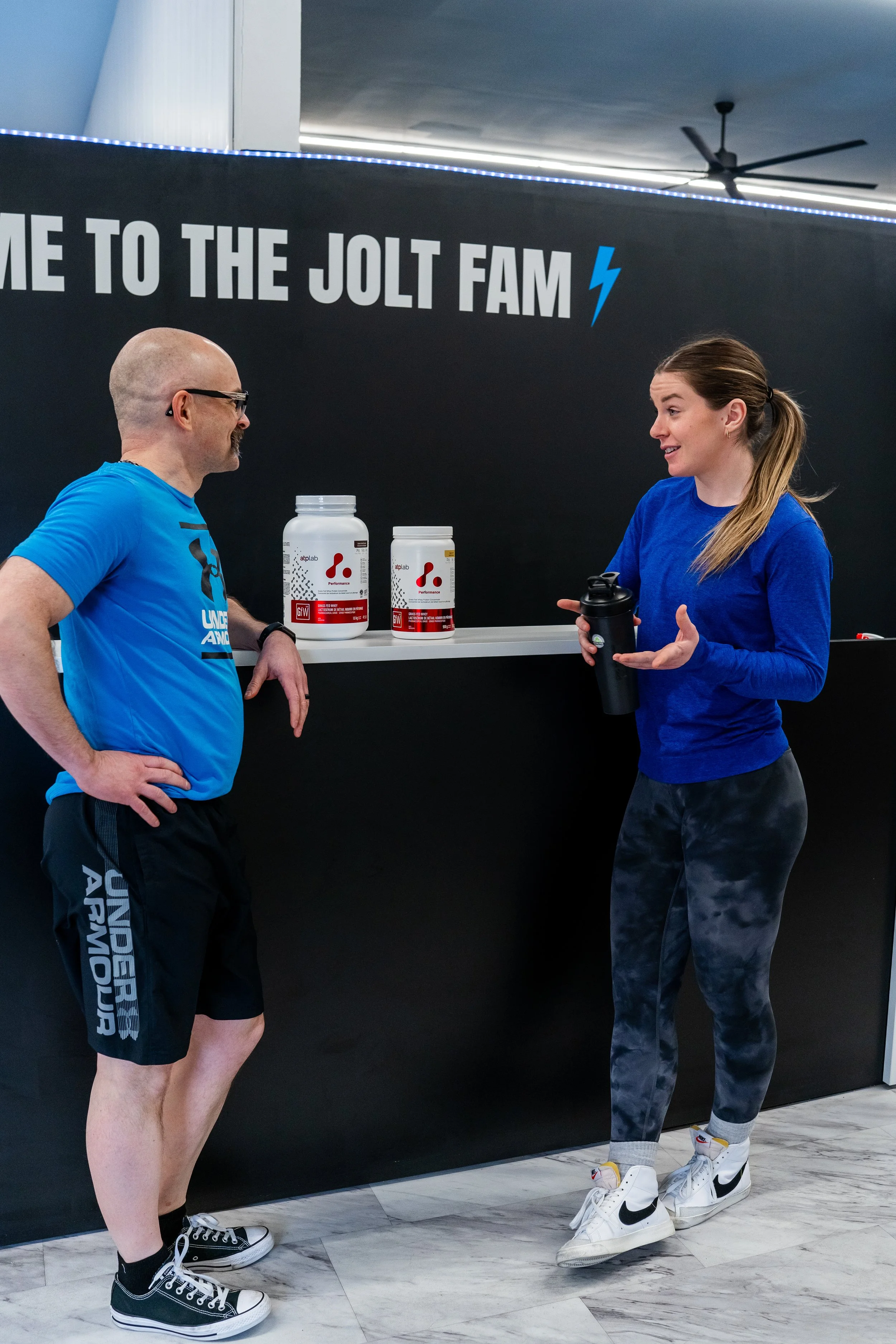Unlock Your Fitness Potential: The Power of Magnesium
It's an essential mineral involved in hundreds of bodily functions, yet it's often overlooked. For those of us dedicated to fitness and resistance training, magnesium plays a crucial role in performance, recovery, and overall well-being. Let's dive into the world of magnesium and discover why it deserves a spot in your daily routine.
Why is Magnesium So Important?
Magnesium is a cofactor in over 300 enzymatic reactions, impacting everything from muscle and nerve function to blood sugar control and blood pressure regulation. It's vital for protein synthesis, energy production (ATP), and DNA repair – all critical for anyone pushing their body through exercise. Think of it as the unsung hero behind the scenes, ensuring everything runs smoothly.
Magnesium and Fitness: A Winning Combination
For fitness enthusiasts, magnesium offers a multitude of benefits:
Muscle Function and Recovery: Magnesium helps regulate muscle contractions and relaxation. Adequate levels can reduce muscle cramps and soreness post-workout. A 2016 study in the Journal of Sports Sciences found that magnesium supplementation improved muscle strength and power in athletes. Another study (2019) in Nutrients demonstrated that magnesium supplementation can reduce exercise-induced muscle damage. Less soreness means you can get back in the gym sooner. Do you love to push yourself hard in the gym? Magnesium could help you recover better, so that you can Lift and Crosstrain on back to back days.
Energy Production: Magnesium is essential for ATP production, the primary energy source for our cells. Sufficient magnesium levels can improve energy levels and reduce fatigue during workouts. Do you feel like you always need a pre-workout boost with caffiene? Consider that you could be Magnesium deficient (pssst. most active non-supplementing individuals are). Who doesn't want more energy to crush their goals?
Improved Sleep: Magnesium plays a role in regulating sleep cycles. Better sleep is crucial for muscle recovery and overall performance. A 2022 meta-analysis in Sleep Medicine Reviews found that magnesium supplementation improved sleep quality, especially in those with insomnia. Recovery happens while you sleep – make it count.
Bone Health: Magnesium is a key component of bone structure and plays a role in calcium absorption. This is vital for preventing injuries and maintaining bone density, particularly important for resistance training. Strong bones are the foundation of a strong body.
Different Types of Magnesium: Which One is Right for You?
Not all magnesium supplements are created equal. It can be overwhelming walking into a supplement store (or even swimming through online social network marketing) influenced by all the brands and their bold marketing claims. Often supplement companies can make over-assuming calls to action, without the appropriate dosage or quality for effective response. The supplement industry lacks regulation, therefore it’s important to choose high quality, transparent brands with third party testing. This will ensure you get the best bang for your buck. Learn more about how to choose a supplement brand here. Different forms have varying bioavailability, meaning how well your body absorbs them. Here's a breakdown:
Magnesium Citrate: Well-absorbed and often used for constipation relief. A good general option. This is usually your cheaper option found at most grocery stores. It won’t necessarily have the benefits you need as a resistance training individual. This is why shopping by price point is not effective.
Magnesium Oxide: Poorly absorbed, generally not recommended for supplementation. Often used as an antacid.
Magnesium Glycinate: Highly bioavailable and gentle on the stomach. Excellent for promoting relaxation and sleep.
Magnesium Bi-Gylcinate: Easily absorbed. Excels at promoting relaxation, reducing anxiety, and improving sleep quality. Additionally may promote cognitive benefits. This is the type of Magnesium we carry at Jolt - shop local with us!
Magnesium Malate: Easily absorbed. Excellent for blood pressure and sugar control. In addition to pain reduction and energy production.
Magnesium Chloride: Well-absorbed and can be applied topically. May help with muscle soreness.
Magnesium Taurate: May have cardiovascular benefits, as taurine can support heart health.
*not an extensive list of all magnesium types
MAGNESIUM: AVAILABLE AT JOLT
"For over a decade, I've been immersed in the fitness world, exploring countless supplements and brands. As a trainer featured on Breakfast Television and working with professional athletes, I've had numerous opportunities to partner with multi-level marketing companies and promote specific products. But those never felt right. My mission at Jolt Fitness is built on trust and education – providing you with honest, science-backed advice. That's why we carefully curate the supplements we carry in our gym. We've chosen ATP Labs, a Canadian company that prioritizes quality. Their products are third-party lab tested, use effective doses of high-quality ingredients (no fillers!), and undergo rigorous testing. Take our magnesium, for example – it combines Biglycinate and Malate (500mg total) with added taurine for optimal results. Shop ATP Labs products here. And to be completely transparent, I don't earn commissions, trips, or points from these sales. Jolt Fitness is simply a retailer, committed to offering only the best (and needed supplements) for our community." - Siggy, Owner of Jolt Fitness
Why Should You Take Magnesium?
Even with a healthy diet, it can be challenging to get enough magnesium. Factors like stress, certain medications, and intense exercise can deplete magnesium levels. You might consider supplementing if you:
Experience muscle cramps or spasms.
Struggle with fatigue or low energy levels.
Have difficulty sleeping.
Are actively involved in fitness and resistance training.
Experience high levels of stress.
Dosage and Considerations:
The "RDA" (Recommended Dietary Allowance) for magnesium represents the amount considered sufficient to meet the needs of nearly all healthy individuals, while "optimal" magnesium refers to a potentially higher level that may provide additional health benefits beyond simply preventing deficiency, even if it's not necessarily considered essential for everyone; essentially, the RDA is the minimum recommended intake, while the optimal level could be slightly higher depending on individual needs and health goals. It's crucial to consult with your doctor or a registered dietitian before starting any new supplement, especially if you have existing health conditions or are taking medications. They can help determine the appropriate dosage and form of magnesium for your individual needs.
Food Sources of Magnesium:
While supplementation can be helpful, it's always best to prioritize getting nutrients from whole foods. Include magnesium-rich foods in your diet, such as:
* Leafy green vegetables (spinach, kale)
* Nuts and seeds (almonds, pumpkin seeds)
* Legumes (black beans, chickpeas)
* Whole grains (brown rice, quinoa)
* Dark chocolate (in moderation!)
CONCLUSION
Magnesium is a powerhouse mineral that plays a vital role in overall health and fitness. By understanding the different types of magnesium and their benefits, you can make informed choices about supplementation and optimize your performance, recovery, and well-being. Prioritize magnesium-rich foods in your diet and talk to your healthcare provider about whether supplementation is right for you. Unleash your full fitness potential with the power of magnesium!





